HolaVPN is a service provided by Hola Networks Limited, out of Israel.
If we had any household names in the VPN industry, Hola VPN would probably be among them. It’s been around since 2012 and boasts of having served more than 200 million users ever since. It presents itself as the foremost P2P VPN in the industry. Unfortunately, I’m not sure that’s the best thing.
This P2P thing doesn’t mean you’re in the best VPN for torrents. It means that your internet access becomes a P2P resource. Let me explain it further.
A typical premium VPN service charges you a fee, and that’s how it pays its bills and stays on business. Free VPNs, on the other hand, collect your online data for sale to data mining companies. Unfortunately, Hola’s business model is not exactly either of those. The network is not supported by the members’ fees but by imposing dubious practices far from secure for its users.
Let’s start at the beginning. In Hola, you have to share your bandwidth with other users in the VPN. So your IP address won’t be hidden from the world at all. Instead, it will be shown as somebody else’s address – another user in the Hola network, and vice versa, your IP will be reported as somebody else’s. That’s what a peer-to-peer VPN is.
HolaVPN is very committed to its P2P VPN model. P2P in VPN networks is a novel thing for sure, but does it bring any value to you as a user? Is it just an intelligent managerial move that’s good for the company and risky for you?
As I stated earlier, the business model in HolaVPN is unusual. The service is offered as freemium (you don’t pay for it with money), but you can sign up for the Plus package and receive additional features. As we keep exploring Hola’s features, let’s remember something: in the digital world, you are the product for sure whenever you don’t have to pay for a product with money. So let’s investigate a little deeper.
The P2P VPN thing is the most peculiar thing about HolaVPN by far, but it’s not the only thing I don’t like about it. For example, one of the most frequent questions I always look to answer about any VPN is: does HolaVPN work with Netflix? Well, it doesn’t, and it’s not a point in its favor.
So as a HolaVPN user, you have to put up with this ridiculous P2P feature, and you can’t use Netflix. So even this early in this honest HolaVPN review, we need to ask if there’s anything Hola can do well. Let’s keep looking.
HolaVPN key features at a glance
| Servers | 950+ |
| No-logs policy | Yes |
| Torrenting | Yes |
| Kill switch | No |
| Price | 3.89 USD/month for one-year plan |
| Country-based | Israel |
| Simultaneous devices | 10 |
| Customer support | FAQ knowledge base |
| Money-back guarantee | 30 days |
HolaVPN and multimedia streaming
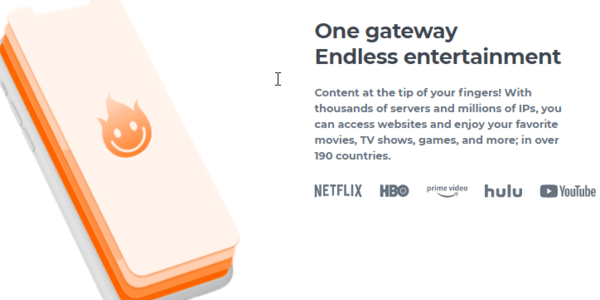
Before Netflix cracked down on VPNs a few years ago, every VPN allowed access to the best Netflix had to offer all around the globe. Unfortunately, Netflix didn’t share in that happiness, so it spent a great deal of effort to stop those users by implementing a fairly advanced detection system that stops VPNs, proxies, and other unblocking tools in their tracks.
These days, VPNs that do work with Netflix are not all that common, and those that do use that ability as a selling point. HolaVPN knows this, so it markets its Plus package as the silver bullet that unlocks many geo-restricted streaming platforms, Netflix among them. I tried my luck with some. ITV and BBC iPlayer worked fine, as well as some others. But not Netflix.
In other services, the trick to Netflix lies in choosing the correct server. But in HolaVPN, you don’t have a server. Instead, you are connected to the internet through your peers in the network, so you can’t just choose another server to solve the problem. And this is where popularity works against you. Most of the IPs available on the network may be already blocklisted by the streaming platforms, so your luck won’t improve from within this network.
Please keep in mind that Hola could work for you on occasion because the network is constantly changing, and the environment could, at times, be such that you will get lucky and unblock Netflix. But intermittent good luck is not what I want from any VPN. Besides, Netflix has had an eye on HolaVPN for a while, and it knows well how to deal with it. So if Netflix is your priority, HolaVPN is not the VPN for you. You’d be better off trying a VPN that gets all Netflix libraries unblocked effortlessly, ExpressVPN, for instance.
Speed performance in HolaVPN
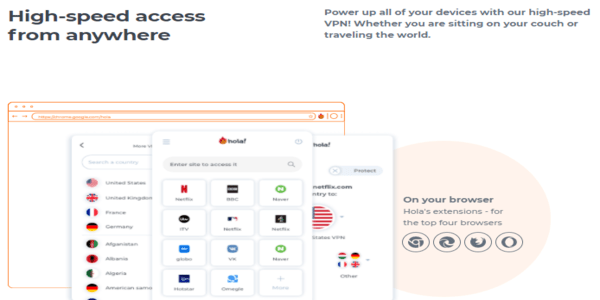
The one thing you must know about HolaVPN is this: it’s not a VPN at all. It’s a P2P proxy service. I am not splitting hairs; it’s just what it is.
So the advertising is misleading for sure. But if speed is your priority, I have good news for you.
| Server | Download (Mbps) | Download % | Upload (Mbps) | Upload % | Ping (ms) |
|---|---|---|---|---|---|
| No server | 97.10 | 100% | 48.05 | 100% | 4 |
| United Kingdom | 94.89 | 97.91% | 46.11 | 94.10 | 88 |
| United States | 90.03 | 92.0% | 44.95 | 94.01 | 111 |
| Australia | 88.14 | 91.02% | 44.12 | 93.87 | 118 |
I tested HolaVPN on an 80Mbps connection. I had a 3ms ping time, 74.5 Mbps for downloads, and 35 Mbps for uploads. This drop in speeds is utterly meaningless, especially when you consider that a real VPN will cause you to lose at least 15% in speeds, depending on your host OS and other factors.
In all honestly, these are among the best speeds I have seen in any VPN I’ve reviewed. Of course, that’s because this is not a true VPN, but many users will overlook that as a mere technicality if their connections remain fast. Gamers, for instance, will be very well served by this feature.
HolaVPN and torrents
If torrenting is a big part of your daily internet experience, stay away from HolaVPN.
We begin with the fact that HolaVPN doesn’t allow torrent traffic on the network. That’s not the worst thing. Furthermore, if you should try to use a torrent client on HolaVPN still, you’d be assuming a severe risk.
The BitTorrent network is a P2P service, as HolaVPN is. That’s why it’s so effective and resilient. And that’s also why it can be so dangerous at the same time.
If you want to torrent safely, you need to have all your traffic encrypted so that no outsider can sniff around your online activity. Encryption is the hallmark of a good VPN service, which Hola is not – more on that later.
So Hola’s interdiction of torrent traffic is not a bad thing, after all. On the contrary, it works in your favor because it saves you unnecessary risks. But, again, if torrenting matters to you, you need a VPN that supports safe torrenting. And, again, ExpressVPN comes to mind.
Security in HolaVPN
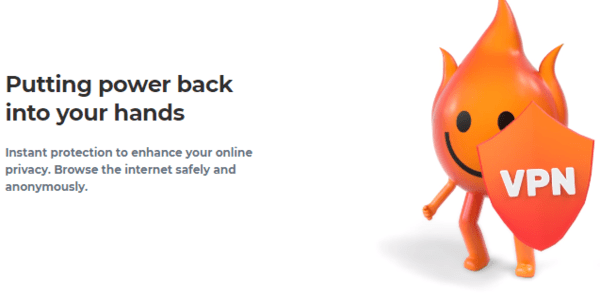
So far, I’ve told you that this service doesn’t work with Netflix, and it’s a terrible choice for torrents. But those are not the worse problems with HolaVPN.
An average VPN user is looking for increased security in his online activities, which is why nobody who takes privacy, anonymity, and security seriously uses free VPNs – they increase security risks instead of lessening them. And that’s the problem with HolaVPN too.
Let me be blunt: using HolaVPN is a risk to your security. Period.
However, the company management seems to be working on improvements; HolaVPN‘s business model still relies on taking advantage of idle resources. Your very own idle resources, to be precise.
As you sign up to HolaVPN’s free version, maybe you don’t realize that you’re signing away the right to use your bandwidth. And yet, that’s precisely what you’re doing.
Suppose another HolaVPN user launches the service on his computer or device. He logs in. He gets your IP address in the network. Then he engages in some type of illegal activity. And how will you learn about this? Because if any law enforcement agency digs into those criminal acts, the IP address they will find responsible for that activity is none other than yours.
Do you think that scenario is a bit paranoid? Do I imagine too much? Well, if my imagination were that fertile, I’d be writing fiction. But, the fact is that such scenarios have happened in reality already.
But there’s more.
Earlier in this review of the HolaVPN service, I mentioned one of the fundamental axioms in the digital economy – if you’re not paying for something, you’re the product. Well, it turns out that Hola Networks Ltd., HolaVPN’s parent company, offers a paid proxy service called BridhtData (formerly Luminati).
So the bandwidth that remains idle in your connection (and those of other HolaVPN users) is often used for the benefit of Luminati’s paying members. So Hola Networks takes your bandwidth, gives you a non-VPN service for free that increases your legal liability for digital crimes, and gives that bandwidth to Luminati’s paying members.
This is a point to remember when deciding if you want to join HolaVPN. Maybe you won’t pay with cash. But you will pay with the risk you willingly assume and the bandwidth you do pay for to your ISP.
HolaVPN and log keeping
VPNs that care for their customer’s privacy don’t keep logs. It’s as simple as that.
If you’ve followed me so far, you already know that your safety is not a priority for Hola Networks at all. So if you were hoping for the company to care about your privacy, I would have to disabuse you of the notion for a change.
HolaVPN collects a lot of data about your online activities. On the website, the VPN admits it collects the following pieces of information:
- Your IP address
- Your name
- Your email
- Your screen name
- Payment and billing information
- Browser type
- Web pages you visit
- Time spent on said pages
- Access times
- Access dates
This is as privacy-friendly as Big Brother. And it’s done with your blessing as you accept the terms.
Before you could think that this comprehensive data collection in HolaVPN is harmless because it’s kept safely for the use of HolaVPN only, you need to reread the small print.
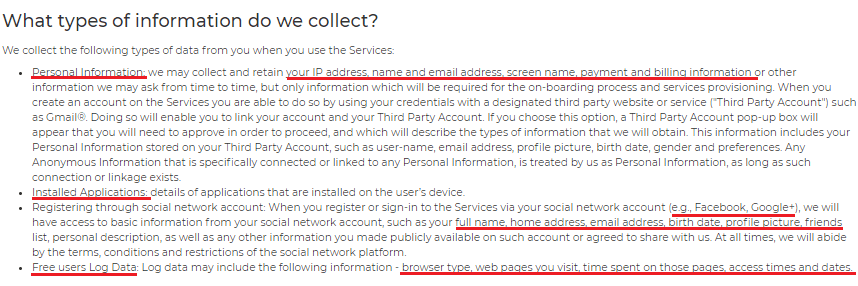
The privacy policy on the site is unambiguous in explaining that all that gathered information can be shared with third parties, partners, and affiliates. The thing we need to realize at this point is that this is not a bug in the system. It’s the feature. It’s the reason why this false VPN (it’s a proxy system, it encrypts nothing) exists in the first place and can afford to remain free for so many users.
The jurisdiction problem
Hola Networks is based in Israel, which means that it must abide by that country’s rules.
I never recommend VPNs based in countries belonging to the Fourteen Eyes Alliance United States, United Kingdom, Canada, France, Germany, Italy, Netherlands, Belgium, Spain, Denmark, Norway, Sweden, Australia, and New Zealand). As Edward Snowden showed to the world, these countries have little or no respect for individual privacy, and their laws reflect that simple fact.
A VPN located in any of those countries will have no choice but to become a surveillance tool against you if the government asks it to do that. Yes, the list does not include Israel explicitly. That being said, the collaborative efforts in intelligence sharing between Israel and many, if not all, of the countries in the 14 eyes alliance are legendary.
A premium VPN service such as ExpressVPN or NordVPN that cares for your privacy keeps no logs. And this holds even for VPNs that are headquartered within countries like the UK or the US.
Does the HolaVPN service include an Adblocker?
The answer is surprising. In service in which security measures are conspicuously absent everywhere, the only feature reminiscent of security is, precisely, the adblocker.
There is no kill switch in HolaVPN because, not being a VPN, the traffic is not encrypted, so you don’t have a secure tunnel from which you can disconnect, thus triggering the switch. It would be best if you had a real VPN for that.
The utter lack of security architecture in HolaVPN means that your IP address leak everywhere.
When I review other VPNs, I test for DNS and WebRTC leaks to understand how secure the network is. No need for that with HolaVPN. Your information leaks everywhere, all the time, because the network is making no effort at all to mask it.
Does HolaVPN work in China?
Not at all.
Several VPNs will allow you to bypass the Great Firewall of China. But doing that requires encrypting your traffic, and since HolaVPN does not encrypt your data at all, it won’t help you with the Chinese firewall.
Pricing in the HolaVPN services
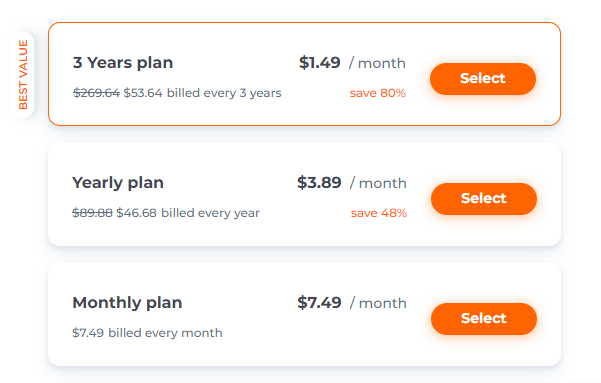
The primary HolaVPN service is free. And it’s terrible value for money if you ask me because your privacy status is worse within HolaVPN than in the open internet environment.
Still, a paid service (Hola VPN plus) in the network offers some value for your fee if you’re willing to see past all of its failures.
The main advantage of the Plus service is that you are removed from the P2P network. That’s the only improvement in terms of privacy.
Do you also get your traffic encrypted? Your data to be out of the logging system? OpenVPN support? Any of the features you could expect from any paid premium VPN service? No.
If the HolaVPN Plus service were free, it would not be worth it. But it’s priced at more or less the same monthly rate as some of the world’s most robust and well-reputed VPNs in the market.
And no, there is no free trial for Hola VPN Plus.
Hola VPN’s 30-day money-back guarantee
There is a 30-day money-back guarantee for HolaVPN Plus.
But trying to redeem it is not an easy thing. The customer support in HolaVPN is as bad as everything else in the network (except speeds) so getting your money back, if you want it, is a long, excruciating process.
Encryption in HolaVPN
If you’re here because you skipped the previous sections so you could find out about encryption quickly, I’ll make it easy for you.
There is no encryption whatsoever in HolaVPN. None at all.
The industry standard is AES-256 encryption, which is military-grade, and most of the best VPNs work on OpenVPN for secure connections. And you will find none of that in HolaVPN.
HolaVPN customer service
If you’ve read so far, you could be thinking I don’t like HolaVPN at all. You’d be right.
Maybe you would also think that nothing I write in what’s left of this extensive HolaVPN review could get any worse. You’d be wrong. This is where I tell you about the network’s customer service.
The first problem with customer service is that it’s pretty hard even to find a link to the customer service page if you look at the website. It’s in the bottom corner, probably because the admins are hoping for you never to find it.
There is no live chat and no ticket system. All the customer service you get is via email, and the chances are that the email you could send will be blatantly ignored.
The HolaVPN user experience
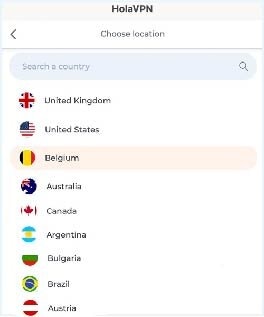
Since your first contact with HolaVPN will probably start with the website, let’s start there.
You’ll find two (and only two) valuable items on the web page: the FAQ and the download links. The rest is nothing but a massive ad for the free HolaVPN service. The emphasis is on the “free” aspect of the network.
Then I downloaded and launched the Windows client. It’s not a client. It’s a glorified browser tab. So I uninstalled it. It is yet another tricky thing in HolaVPN that’s borderline fraudulent. Why bother with a false app when you can just develop a browser extension and make it available to the public?
The navigation is easy but not intuitive. For example, it starts with a list of services to unblock – not a list of countries to which you can connect. So I just chose a random thing to unblock. After that, I was shown, at last, the country list.
The variety in the country list is impressive as it includes some rather exotic places. That’s useful for P2P networks but, honestly, irrelevant for most users.
I would very much like to tell you now about the settings menu. But there are none. You can see the recent sites you’ve visited. There’s nothing else.
The only setting worth talking about is the language selection, which offers thirty languages. Unfortunately, I only speak about six languages, and I did not try them all, so I can’t attest to the accuracy in the translation of those 30 languages.
And this is where I will tell you the one good thing I can say about HolaVPN. It’s very user-friendly, and even newcomers to the VPN world will learn to use it quickly and with ease – but they won’t be in the VPN world, of course.
Final thoughts on HolaVPN
You use a VPN to have extra protection to your anonymity, your security, and your privacy. Unfortunately, HolaVPN adds nothing and subtracts a lot.
Let’s be optimistic and give the best-case scenario: a VPN-like network allows you to access some blocked content. But, unfortunately, the other side of the coin is there too: it’s a risky network with no security or privacy features, which carries a history of misbehavior towards users.
Let’s put aside the lack of privacy issues for a moment. The speeds are outstanding, better than in any VPN (because it’s not a VPN), and the P2P nature of this beast will help you deal better with regional blocks.
But since the connection you’ll get depends on the other users in the network, whatever good behavior you can achieve in HolaVPN is inconsistent.
An essential factor for many users is a VPN’s ability to unblock Netflix. Unfortunately, HolaVPN will not help with that.
So what we have is a P2P proxy network marketed, falsely, as a VPN that includes no encryption whatsoever; it doesn’t hide your IP address but merely assigns it to another user; it leaks your address everywhere; it collects too much data; it’s useless for streaming websites; it abuses your bandwidth; it does not allow torrents; it doesn’t work in China.
So the verdict on HolaVPN is straightforward. I can’t recommend it as a VPN because it’s not one. As a P2P proxy service, the best I can say is that it’s speedy. But it’s suicidal to use it if your privacy and your safety are priorities.
The VPN industry offers many great options that will give you everything that HolaVPN does not (encryption, security, Netflix access, no logs kept, and many other features) at reasonable prices. Do a quick VPN comparison and you more likely will agree to me.
If you adopt HolaVPN, you won’t be using it. However, it will be using you and your resources on behalf of its paying customers. So when it comes to HolaVPN, the only word that comes to mind is “adiós.”
